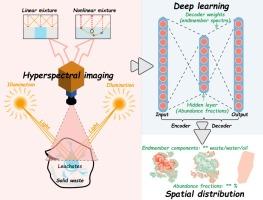通过高光谱非混合法揭示水和油对基于高光谱成像的固体废物特征描述的非线性影响。
IF 7.1
2区 环境科学与生态学
Q1 ENGINEERING, ENVIRONMENTAL
引用次数: 0
摘要
利用近红外高光谱成像(HSI)结合机器学习模型对固体废物进行快速表征的研究越来越多,以取代传统的费时费力的方法。然而,废物沥滤液或其他馏分等的污染会导致光谱演变,并严重影响识别性能,而这一问题此前尚未得到研究。以水的 O-H 振动引起的非线性反射率变化以及与油和沥滤液相关的不清晰变化为例,首次尝试使用高光谱非混合(HU)技术提取末端成员成分,并证明其对固体废物的贡献(丰度)。研究人员获取了受纯水、油和三种沥滤液影响的各种固体废物成分的 HSI 光谱。研究人员开发了一种基于 HU 模型的新方法,包括交替最小二乘法多变量曲线分辨率和最先进的自动编码器架构(深度学习模型),用于估算内含物的光谱及其在单个像素中的丰度。然后得出它们在固体废物中的空间分布概况。所选模型通过独立的测试数据集进行了验证,光谱角距离较低,为 12.3° ± 6.5°,表明预测的内含物与真实成分相似。内含物分布图的最小均方根误差为 0.17。水和油等非线性液体对固体废物光谱变化的影响清晰可见。此外,该方法还能从混合光谱图像中提取信息并生成重建光谱。本文章由计算机程序翻译,如有差异,请以英文原文为准。

Unveiling the non-linear effects of water and oil on hyperspectral imaging-based characterization of solid waste by hyperspectral unmixing
Rapid characterization of solid waste using near-infrared hyperspectral imaging (HSI) coupled with machine learning models has been increasingly investigated to replace the traditional time- and labor-intensive methods. However, contamination by waste-derived leachates or other fractions etc., can cause the spectra evolutions and significantly influences the identification performance, which has not been investigated before. The first attempt was made by using hyperspectral unmixing (HU) to extract the endmember components and demonstrate their contributions (abundance) to solid waste, taking the non-linear reflectance changes due to the O–H vibration of water and unclear variation associated with oil and leachates as an example. The HSI spectra of various solid waste components influenced by pure water, oil and three kinds of leachates were acquired. A novel method based on HU models, including multivariate curve resolution with alternating least squares and state-of-the-art autoencoder architectures (deep learning models), was developed to estimate the spectra of endmembers as well as their abundances in individual pixel. Their spatial distribution overview in solid waste was then yielded. The selected models were validated via an independent test data set, with lower spectral angle distance, 12.3° ± 6.5°, indicating the similarity of the predicted endmembers with real components. And the lowest root of mean square error on endmember distribution maps was 0.17. The non-linear liquid’s effects by water and oil on spectra variations of solid waste were clearly illuminated. Additionally, the proposed method can extract information from mixed spectroscopic images and generate reconstructed spectra.
求助全文
通过发布文献求助,成功后即可免费获取论文全文。
去求助
来源期刊

Waste management
环境科学-工程:环境
CiteScore
15.60
自引率
6.20%
发文量
492
审稿时长
39 days
期刊介绍:
Waste Management is devoted to the presentation and discussion of information on solid wastes,it covers the entire lifecycle of solid. wastes.
Scope:
Addresses solid wastes in both industrialized and economically developing countries
Covers various types of solid wastes, including:
Municipal (e.g., residential, institutional, commercial, light industrial)
Agricultural
Special (e.g., C and D, healthcare, household hazardous wastes, sewage sludge)
 求助内容:
求助内容: 应助结果提醒方式:
应助结果提醒方式:


